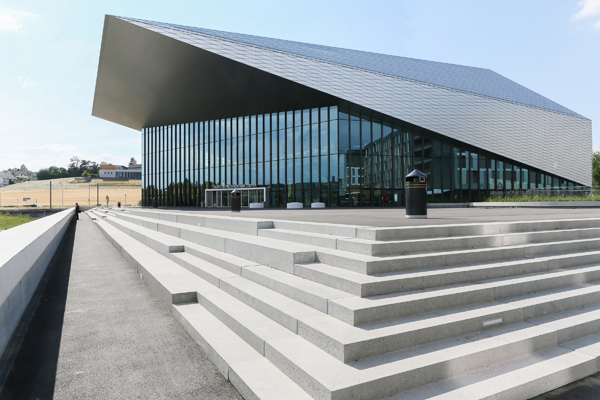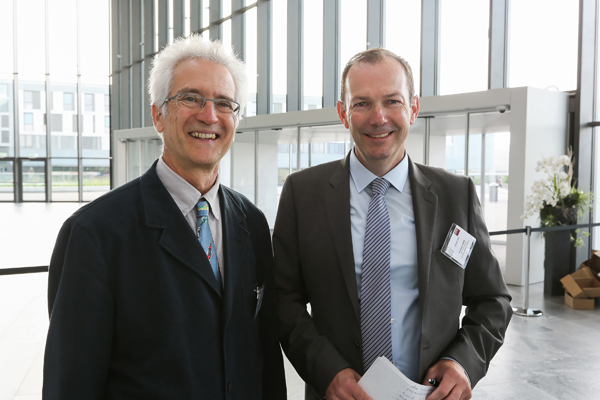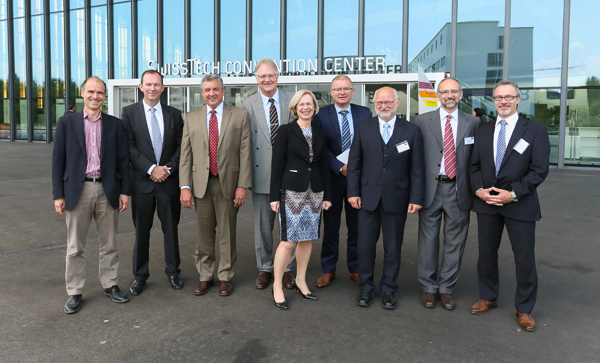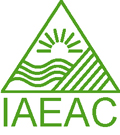The Symposium took place at the new SwissTech Convention Center, from the Ecole Polytechnique Fédérale de Lausanne (EPFL), inaugurated 3 months before.

Fig. 1: The Swiss Tech Concention Center, Lausanne.

Fig. 2: The chairmen of the meeting were Dr. Luiz Felippe de Alencastro (Left, Central Environmental Laboratory – EPFL) and Prof. Markus Fisher (right, Hamburg School of Food Science – University of Hamburg).
At this occasion, for the first time, IAEAC organised a joint meeting dealing with strategies for environmental and food analysis in its ISEAC series. And it was a successful meeting, near 300 scientists from all continents attending the event.
In the conference, the following areas were covered:
Environment
- Detection and identification of organic pollutants and related compounds
- Environmental sampling and sampling strategies; passive sampling
- In situ, sensors; biosensors
- Multi residues methods; references materials; method validation
- Organic and inorganic mass spectrometry
- Proteomics and metallomics-based studies;
- Speciation
Food
- Contaminants and residues
- Authenticity
- Food packaging materials
- Rapid testing strategies
- Food profiling
- Genomics-, proteomics-, metabolomics-, and element-based strategies (targeted and non-targeted spectrometry)
- Biosensor technologiesRisk assessment
The programme was dense and included 14 Invited Lectures that introduced the different topics of each journeys presented by 41 oral talks.
With the wish to broaden the horizon and the attractiveness of the symposium to the general public, an open lecture was given by Dr. Steven Musser, Deputy Center Director for Scientific Operations, Center for Food Safety and Applied Nutrition, Food & Drug Administration (FDA, USA). His talk was entitled « Food Safety: Simple Goals ‐ Complicated Realities ».
World Food Forum
One of the aims of this 38th edition was to open the discussion regarding Food safety. Food safety is not only a matter of health protection, it is affected by a complex network of many stakeholders, economic groups and individuals. The complexity of the food chain is becoming more and more interdisciplinary and global. How can we assure food safety by the interplay of authorities, industry and last but not least by institutions that are responsible for education and teaching all over the world? Do we need novel and innovative strategies to ensure safe food or to overcome food fraud? Are there demands for new analytical approaches to assure product identification and food traceability?
The International Think Tank on Food Safety was an event that brought together leading food safety experts from Europe and USA to approach and discuss food safety globally. This discussion provided the opportunity to learn about food safety along the whole food supply chain in a global context.
The discussion group was composed of stakeholders of different perspectives. Each member had its own field of vision. The authorities group addressed several utmost important key issues like approaches for new international accredited standards in food quality and safety assessment and guidelines for the whole food supply chain (from farm to fork). Also regulations for governmental import and export inspections or international accepted certification and risk assessment systems for foods seemed to be of high interest in this group. It was also discussed about the key tool to ensure the cross-border follow of information to rapidly react when risks to public health are detected in the food chain which is called RASFF – the Rapid Alert System for Food and Feed.
Food fraud or food fakery, safe delivery lines (carriers, importers and retailers) and a safe food production (manufacturers) are core topics for the Food industry. These questions ask for dynamic in-house quality management mechanisms, highly developed risk management and backtracking systems.
For the service providers harmonized performance criteria for methods and their application in food for safety and quality analyses are required. New technologies (e.g. rapid methods, Omics-cascade) and their application for routine testing demands also for specialized curricula at the universities and also for programs dealing with the professional development.
The discussion was leaded by Prof. Nöhle the former chief executive officer of the Nordzucker AG. He has now his own interim- and crisis management firm dealing with fraud management, industrial quality management and the mediation between business partners and government authorities. Thus, Prof. Nöhle was a brilliant expert for the discussion about Food Safety in a global context.

Fig. 3: The Think Tank Team. Michael Beer (Director Food Safety Division, Federal Office of Public Health, SWITZERLAND), Prof. Dr. Markus Fischer (Chairman of the Think Tank, Hamburg School of Food Science, University of Hamburg, GERMANY), Steven Musser, Ph.D., FDA (Food & Drug Administration, Deputy Center Director for Scientific Operations, Center for Food Safety and Applied Nutrition, FDA, USA), Prof. Dr. Ulrich Noehle (Anchorman of the Think Tank, Otterndorf, GERMANY), Elke Anklam, PhD (European Commission, Directorate General Joint Research Centre, Institute for Reference Materials and Measurements, BELGIUM), Christian Hummert, Ph.D. (Director AGRI and CTS Food, SGS Germany, GERMANY), Reiner Wittkowski, Ph.D, Prof. (Vice President, Federal Institute for Risk Assessment, GERMANY), Anthony Huggett (Head Corporate Quality Management, Nestlé, SWITZERLAND), Silvio Raggini (Head Quality Management, COOP, SWITZERLAND).

